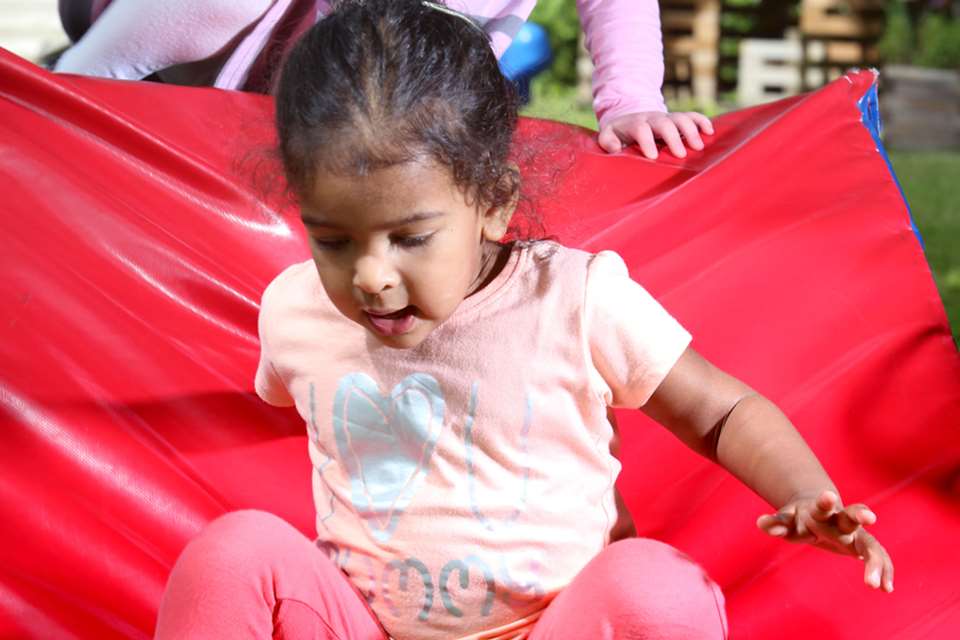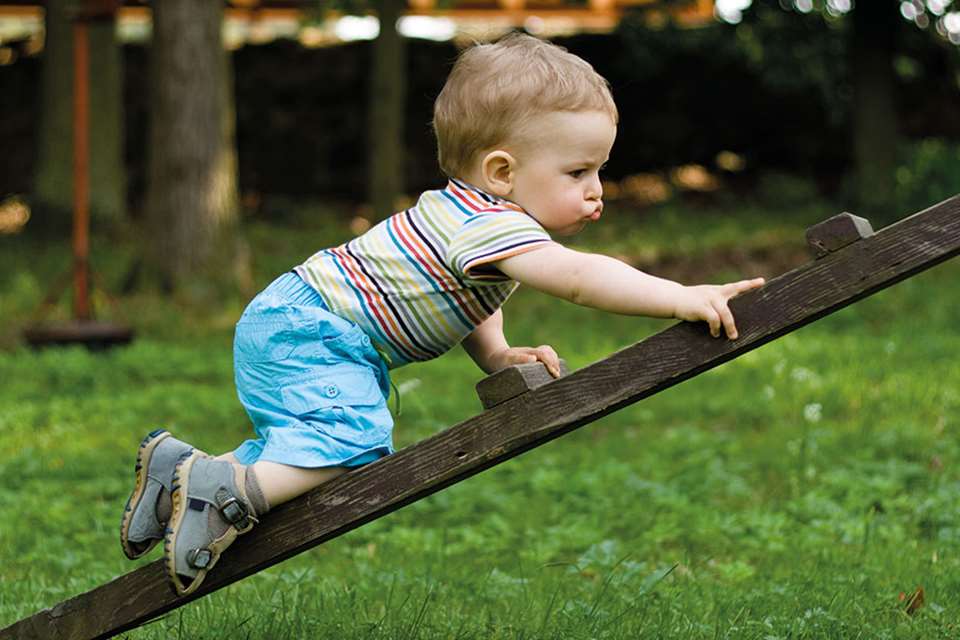Learning & Development: Movement Play - Kick start
Tania Swift
Monday, August 7, 2017
In an extract from her new book, Tania Swift explores the importance of physical development to learning and how to encourage it

Children need time to play and move on their own, discovering and exploring what their bodies can do. They also need adult-led activities that will challenge and guide them to develop to the best of their ability. They should be able to explore the environment and choose what they do for a large part of their day, developing skills naturally, and well-planned adult-led activities will enhance this development. These activities should be interesting for children in order for them to want to engage, as well as instilling a love of being active.
Children also, of course, need to develop their fine motor skills. First, they need to develop many gross motor skills that underpin their fine motor ability and ability to approach tasks such as writing and cutting with scissors. Consider the important components for effective writing: posture and balance for hand and arm control; strong muscles in their back, stomach, neck and shoulders to support refined hand and finger skills; bilateral co-ordination, for example, using both hands at the same time; spatial awareness to organise what is on the page; and hand-eye co-ordination to guide their hand across the page. These are all developed through play and physical activities when children are young.
More and more children are lacking access to opportunities to be active and to develop appropriately at home, so we need to look at ways to support this development and encourage more positive activity.
PD AND WELL-BEING
It is essential for children to be on the move for a large part of each day in order for them to develop physically, through enjoyable activities they can learn about and come to understand the importance of taking care of themselves. Physical activity:
- develops gross motor and fine motor skills
- supports healthy growth and development
- develops and maintains flexibility
- develops decision-making and problem-solving skills
- supports brain development
- helps concentration
- promotes confidence and self-esteem
- helps children to learn about their bodies
- promotes resilience and helps children understand their abilities and boundaries
- helps children to learn about a healthy lifestyle and what is good for them
- enables children to learn about healthy food through food growing and food-based games and activities
- can teach hygiene through fun activities and active stories and rhymes
- supports the development of fine motor skills, communication skills and understanding, to allow for independent self-care or with a little support from others
- develops communication skills to allow children to share their feelings and to inform others of their needs.
HOW MUCH ACTIVITY?
Many countries have developed physical activity guidelines; worryingly, many have not.
UK The British Heart Foundation recommends that children from walking to five years old should be active for a minimum of 180 minutes a day to stay healthy and to develop. This needs to be spread out throughout the day and be a combination of moderate and high-impact physical activities.
Moderate physical activity is when a child is moving their belly button from one place to another; for example, pottering. This is called translocation of the trunk. High-impact physical activity is when children have the opportunity to get their heart rate up or get out of breath.
Australia The guidelines in Australia are very similar to those in the UK: children from birth to five should be physically active every day for at least three hours, spread throughout the day. Children aged five to 12 years should be physically active for at least 60 minutes a day, including moderate to vigorous-intensity physical activity.
Canada Canadian guidelines suggest that children aged one to four should be physically active every day for at least three hours, spread throughout the day. They should progress towards at least 60 minutes of high-impact activity by five years of age.
New Zealand There are no specific guidelines for under-fives; however, they should be encouraged to move every day. Children and young people aged five to 18 years should be physically active for at least 60 minutes a day, including moderate to vigorous-intensity physical activity.
Finland Children up to the age of seven years should have at least two hours of brisk physical activity every day.
SKILLS
Early years physical skills
There are many schemes of work and resources available for early years practitioners to follow; however, it is important to start with the basics and to provide activities that work for the children in your care. Practitioners need to be aware of the skills that children in the early years need to develop and then help them to do so.
There are basic physical skills that children in the early years need to learn. Teachers and early years practitioners will be aware of the obvious skills such as jumping, throwing, catching and balancing. There is an array of skills that children should have the opportunity to develop but often don’t. Children also need to learn social and emotional skills such as taking turns, working in pairs and following rules through physical activities.
Knowledge of skills is gained through education and supportive resources, but also through experience. If a whole group of three-year-olds can jump and one cannot, then it will be obvious that that particular child will require additional support for that skill. But if you do not first focus on that basic skill, there is a risk that you might take it for granted that all children can jump.
The outdoor and indoor environment can be set up to encourage children to try various skills by themselves. It is also important to give them opportunities to develop these skills more formally to ensure all children are developing appropriately. Furthermore, being able to do what their peers can do will have a marked impact on their confidence.
If a child is behind the other children developmentally in their year group or struggling with a specific skill, try to break down what they are attempting to do in order to identify why they are finding it challenging. Ask yourself questions, such as, is it a lack of balance, poor co-ordination or do they have poor muscular strength? Once you understand their needs, you can better support them to achieve those skills. It is important that young children have many opportunities to repeat a skill with small challenges added from time to time. If the task is not achievable, they may just give up.
When planning, identify three or four skills a week; planning daily activities based on these skills will give activities more of a focus and ensure that children will have the opportunity to develop all the skills they need. The skills can be incorporated into known activities, used individually for simple activities throughout the week, used to create wild and wonderful active stories (they don’t have to be best-sellers!) and used to make up new games and activities based on a combination of skills (see below).
Fundamental skills
The next step for children is to become proficient in fundamental movement skills in order to take part in more complex games and sport when they are older. If children do not have enough opportunity to practise these skills, then they could spend the rest of their lives playing catch-up. The fundamental movement skills are divided into three categories:
Body Management Balance, bending, climbing, jumping, landing, leaping, rolling, stopping, stretching, swinging, turning, twisting.
Locomotor Crawling Dodging, galloping, hopping, jumping for distance, jumping for height, leaping, running, skipping, walking.
Object Control Bouncing, catching, dribbling, kicking, rolling, striking, throwing.
When teaching these skills, you should keep these points in mind:
It is important that children start to develop the fundamental movement skills in the early years.
Children need instructional time to develop fundamental movement skills, as they do not necessarily come naturally.
They need between 240 and 600 minutes of instructional time to become proficient in any one fundamental movement skill.
Each skill should be focused on individually, or two or three skills at any one time.
PHYSICAL SKILLS
Physical skills for the early years include:
Aiming, avoiding, balancing, bending, bouncing, carrying, catching, changing direction, chasing, clapping, climbing, combining movements, crawling, creeping, cutting, digging, dodging, drawing, dribbling, evading, experimenting, galloping, gesturing, grasping, handling, hanging, hiding, hitting, holding, hopping, jumping, kicking, landing, leaping, lifting, lying, marching, matching, painting, picking up, pinching, pivoting, placing, pointing, predicting, pressing, prodding, pulling, pushing, reaching, rocking rolling, rotating, running, scoring, shooting, shuffling, skipping, sliding, slithering, speed, spinning, squatting, squeezing, stacking, standing, stepping, stopping, stretching, tiptoeing, tapping, throwing, turning, twisting, volleying, walking, waving, wiggling, writing.
ACTIVE PLAY
Learning Through Movement and Active Play in the Early Years:A practical resource for professionals and teachers by Tania Swift (Jessica Kingsley Publishers, £14.99) makes the case for ‘embodied learning’: we learn as we move and we need to move to learn. As well as explaining the importance of physical activity for promoting young children’s cognitive learning, well-being and physical development, it sets out tips and examples for incorporating physical activity into the early years curriculum. To order, visit: www.jkp.com/uk
This is an edited extract of from Learning Through Movement and Active Play in the Early Years by Tania Swift (Jessica Kingsley Publishers, £14.99).
[asset_library_tag 1524,Download the PDF]









